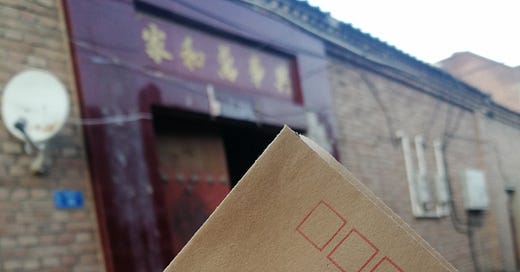微故事 Wēi Gùshì Little Stories is a series of occasional vignettes, written in Simplified Chinese characters for intermediate level readers, featuring objects in the 胡同 and in the lives of 枝丫’s denizens. For learners, each post includes an image of the object, an illuminated sentence, an audio of the sentence pronounced sequentially for listen-and-repeat practice, and a 句子拼图 jùzi pīntú sentence jigsaw puzzle.
有一个人今天下班下得比平时早得多。 离晚上还早,而且他有时间在回家前去张老板的书店。但是,在炙热的阳光下,天气热得要命。他走路走得很快。
他一边走,一边想,他在考虑是否需要改掉一个坏习惯。他的妻子不喜欢这个习惯。他想,当他看到地上几张折起来的纸时,他的沉思被打断了。他停了一下,然后站住了。这是什么?他做这件事做得太久了。
他弯腰把这几张折起来的纸从地上捡起来。他看了看这几张纸的外面。看到只是几张简单纸。
我非常好奇,他想。我能不能打开?不是我的,是主人的。谁把它丢了?主人是谁?
这个人感觉有一些矛盾心理。
他抬头看了看周围。他看见前面有一个老人。他想,不可能是那个老人把它丢在地上的。为什么一个老人会带着几张折起来的纸?
他想,我想打开这几张纸看看里面有什么。但是,我想做某事并不意味着我就应该去做。即使我想做某事,我也需要学会不做。
我需要练习改掉我的坏习惯。过去,我做得没有那么好。
现在我可以做得比以前好。
这个人在大太阳下等得太久了,他热得出汗了。
这个人很快来到了张老板的书店前面。他是张老板书店的老顾客。他想不起多久了。他可以问张老板这个信封可能是谁的。
这个人希望知道里面是什么,但是,他仍然没有打开这个信封。他进了张老板的书店。
Word List
炙热的阳光 zhì rè de yáng guāng blazing sun
命 mìng life, fate, order or command
要命 yàomìng to cause someone’s death, very, extremely
热得要命 rè de yàomìng terribly hot
沉 chén to submerge, to immerse, to sink (沉默 chénmò silent, uncommunicative, taciturn)
沉思 chénsī state of deep thought or contemplation, state of quiet, focused reflection
住 zhù stop, make firm
站住 zhànzhù to stop, to stand still
弯 wān to bend or curve
腰 yāo waist, lower back
弯腰 wān yāo bend at the waist, bend over
捡 jiǎn to pick up, collect, gather
某 mǒu certain
某事 mǒu shì something
即使 jíshǐ even though
快到 kuài dào
周围 zhōuwéi all around, surroundings, environment
意味着 yìwèizhe to mean, to signify, to imply
Illuminated sentence by Mary of Mary’s Chinese Sentences.
他走路走得很快。
S. + V. + O. + V. + 得 + adv. + adj.
Tā zǒulù zǒu dé hěn kuài.
He walks very fast.
句子拼图 Jùzi pīntú Sentence Jigsaw Puzzle
Put the pieces of the sentence below in the correct order.
走路 快 很 他 走 得
Scroll up to check your answer.
(This sentence is an example of a complement of degree.)
加油!
Notes
This 微故事 contains at least one sentence each with a complement of result, potential complement, complement of manner, complement of consequential state, complement of location/destination, and complement of degree.
"Complements in Chinese are those elements of a sentence which come after the verb (apart from the object) and which either describe the action of the verb or express its result. A number of complements which occur with action verbs have already been encountered, for example, aspect markers, direction indicators and duration/frequency markers. Here we introduce a further range of complements, those indicating result, potential, manner, location/destination and degree.” (115)
“Ability or inability to do something is regularly expressed by a potential complement. This is formed by placing 得 de (positive) or 不 bù (negative) between a verb and a complement of result. The potential complement, which is a distinctive feature of Chinese, implies that the result of the action can (or cannot) be achieved or happen, that is, that the outcome is to some extent dependent on external circumstances beyond the speaker’s control.” (118)
Po-Ching, Y., & Rimmington, D. (2021). Chinese: An Essential Grammar (3rd ed.). Routledge.
Photo taken by Mary in a 呼和浩特 Hūhéhàotè Hohhot 胡同 hutong, 内蒙古 Nèi Měnggǔ, Inner Mongolia.
About 枝丫
Table of contents with links to chapters and other resources
Main page: Twig 枝丫: A fantasy novel





